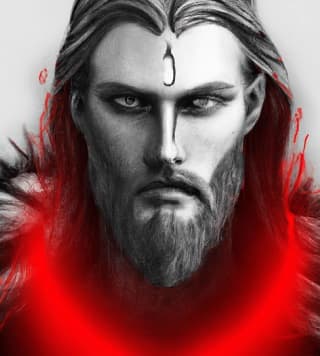Óðr - God of Norse Mythology

Óðr, husband of Freyja and god of divine madness, poetry, and long journeys, depicted in a modern artwork inspired by Norse mythology.
Óðr (pronounced: "oh-thur") also known as Odr, is a figure in Norse mythology associated with the goddess Freyja. While there is little information about him in the surviving sources, he is mentioned as Freyja's husband and the father of their two daughters, Hnoss and Gersemi.
The name Óðr is derived from the Old Norse word meaning "possessed" or "possessed by madness". It is believed to be related to the name of the god Odin, with whom Óðr shares some similarities, including a connection to magic and long journeys. However, it is not confirmed whether they were the same deity.
The name "Óðr" in Old Norse runes is written as:
ᚢᛏᛦ
In the Völuspá, a kenning names Freyja as "wife of Óðr". In the Hyndluljóð, the völva Hyndla remarks that Freyja is always longing to see Óðr. In the Gylfaginning, Snorri Sturluson explains that Óðr is Freyja's husband and that she often mourns him because he has a habit of leaving her for long periods of time to travel around the world.
It is also possible that Óðr was one of the hostages given by the Æsir to the Vanir as part of a peace agreement, and that he was chosen to marry Freyja. However, there is no definitive evidence to support this theory.
Please note that the information provided about Óðr and Norse mythology is complex and may be subject to interpretation and debate. The myths and stories of Norse mythology have evolved and been passed down through oral tradition and written accounts, and there may be variations in the way they are told and understood. This information should be used as a general reference and not as a definitive source on the subject.
If you notice an error on this web page, please email us at contact@historylists.org and let us know about it. Please be sure to include a brief description of the mistake you have noticed, along with the location of the mistake on the web page (e.g., the specific section or paragraph where it appears). We appreciate your help in keeping our website accurate and will use the information you provide to make necessary updates as soon as possible. Thank you for your assistance!
Other Norse Gods and Goddesses
- Baldr (Æsir) - God of Light, Beauty, and Goodness.
- Beyla (Ásynjur) - Goddess of Agriculture.
- Bil (Ásynjur) - Associated with the Moon.
- Borr (Æsir) - Father of the Norse Gods.
- Bragi (Æsir) - God of Poetry and Song.
- Byggvir (Vanir) - God of Agriculture.
- Dagr (Æsir) - God of Day.
- Dellingr (Æsir) - God of the Dawn.
- Eir (Ásynjur) - Goddess of Healing and Protector.
- Fjörgyn (Ásynjur) - Goddess of the Earth.
- Fjörgynn (Æsir) - God Associated with the Heavens.
- Forseti (Æsir) - God of Justice and Reconciliation.
- Freyja (Vanir) - God of Love, Fertility, War, and death.
- Freyr (Vanir) - God of Fertility and Prosperity.
- Frigg (Ásynjur) - Queen of the Gods.
- Fulla (Ásynjur) - Goddess of Fertility.
- Gefjon (Ásynjur) - Goddess of Fertility.
- Gerðr (Ásynjur) - Goddess of the Earth.
- Gersemi (Vanir) - Goddess of Precious Objects.
- Gná (Ásynjur) - Messenger of the Gods.
- Gullveig (Vanir) - Goddess of Witchcraft and Sorcery.
- Heimdall (Æsir) - Watchman of the Gods.
- Hel (Æsir) - Goddess of the Underworld.
- Hermóðr (Æsir) - Messenger of the Gods.
- Hjúki (Æsir) - Associated with the Moon.
- Hlín (Ásynjur) - Goddess of Protection.
- Hnoss (Vanir) - Goddess of Beauty and Treasure.
- Höðr (Æsir) - God of Darkness.
- Hœnir (Æsir) - God of Creation.
- Iðunn (Ásynjur) - Goddess of Immortality.
- Ilmr (Ásynjur) - Ancient and Little-Known Deity.
- Irpa (Ásynjur) - Ancient and Little-Known Deity.
- Ítreksjóð (Æsir) - Son of Odin.
- Jörð (Ásynjur) - Goddess of the Earth.
- Kvasir (Vanir) - God of Wisdom.
- Lóðurr (Æsir) - God of Creation.
- Lofn (Ásynjur) - Goddess of Love.
- Loki (Æsir) - God of Mischief and Deception.
- Magni (Æsir) - God of Strength.
- Máni (Æsir) - God of the Moon.
- Meili (Æsir) - God of Travel.
- Móði (Æsir) - God of Courage.
- Mimir (Æsir) - God of Wisdom.
- Nanna (Ásynjur) - Goddess of Love and Devotion.
- Njörðr (Vanir) - God of the Sea and Fertility.
- Njörun (Vanir) - Goddess of the Earth.
- Nótt (Æsir) - Goddess of the Night and Dreams.
- Odin (Æsir) - God of Creation and King of the Gods.
- Óðr (Vanir) - God of Divine Madness, Poetry, and Long Journeys.
- Rán (Ásynjur) - Goddess of the Sea and Death.
- Rindr (Ásynjur) - Goddess Associated with Vengeance.
- Sága (Ásynjur) - Goddess of Wisdom.
- Sif (Ásynjur) - Goddess of Abundance.
- Sigyn (Ásynjur) - Goddess of Loyalty.
- Sjöfn (Ásynjur) - Goddess of Love.
- Skaði (Ásynjur) - Goddess of Hunting, Skiing, and Winter.
- Snotra (Ásynjur) - Goddess of Wisdom.
- Sól (Ásynjur) - Goddess of the Sun.
- Syn (Ásynjur) - Goddess of Vigilance, Guardianship, and Defense.
- Þorgerðr Hölgabrúðr (Ásynjur) - Goddess Associated with Protection.
- Thor (Æsir) - God of Lightning and Protection.
- Þrúðr (Ásynjur) - Goddess of Might and Strength.
- Týr (Æsir) - God of War and Justice.
- Ullr (Æsir) - God of Skiing, Archery, and the Hunt.
- Váli (Æsir) - God of Revenge.
- Vár (Ásynjur) - Goddess of Oaths and Agreements.
- Vé (Æsir) - God of Creation.
- Víðarr (Æsir) - God of Vengeance.
- Vili (Æsir) - God of Creation.
- Vör (Ásynjur) - Goddess of Wisdom and Vigilance.